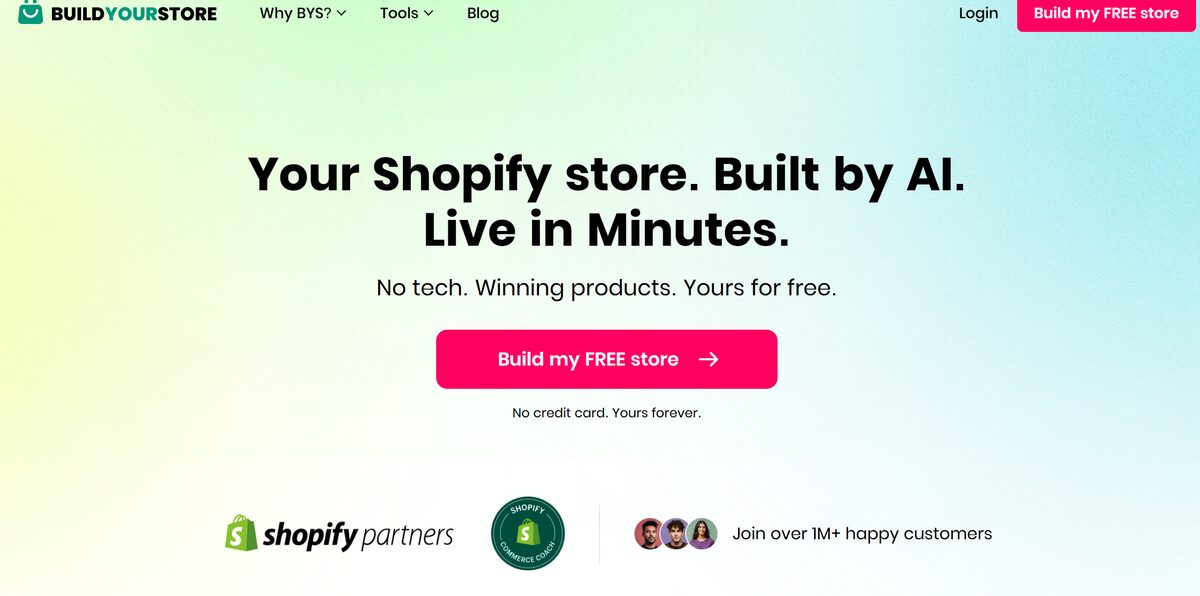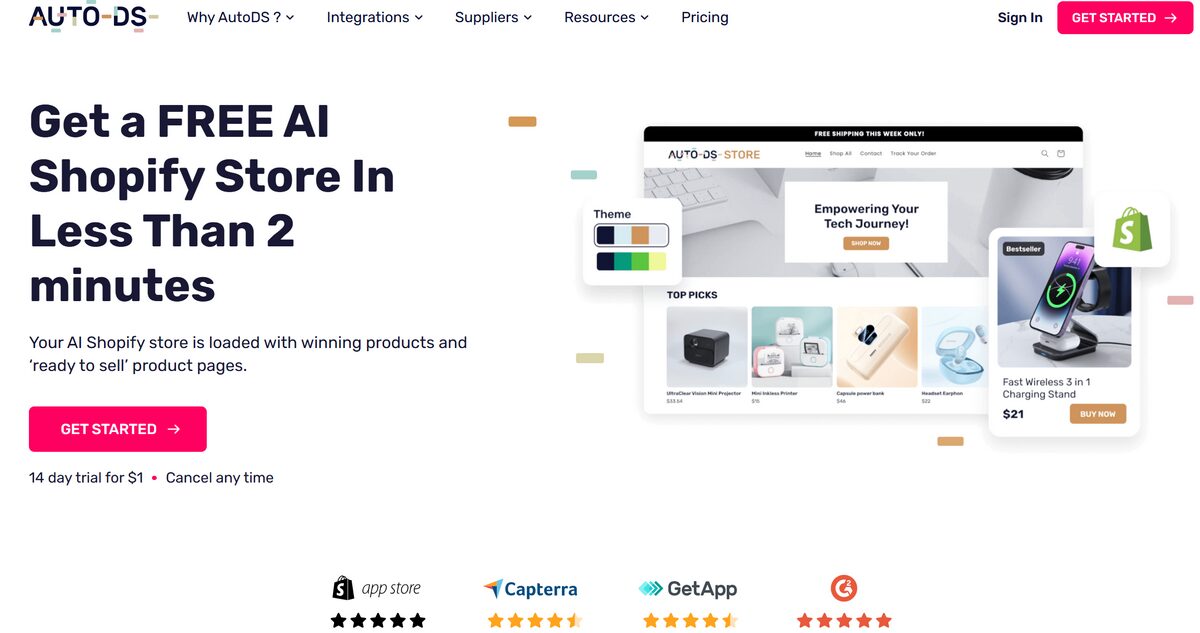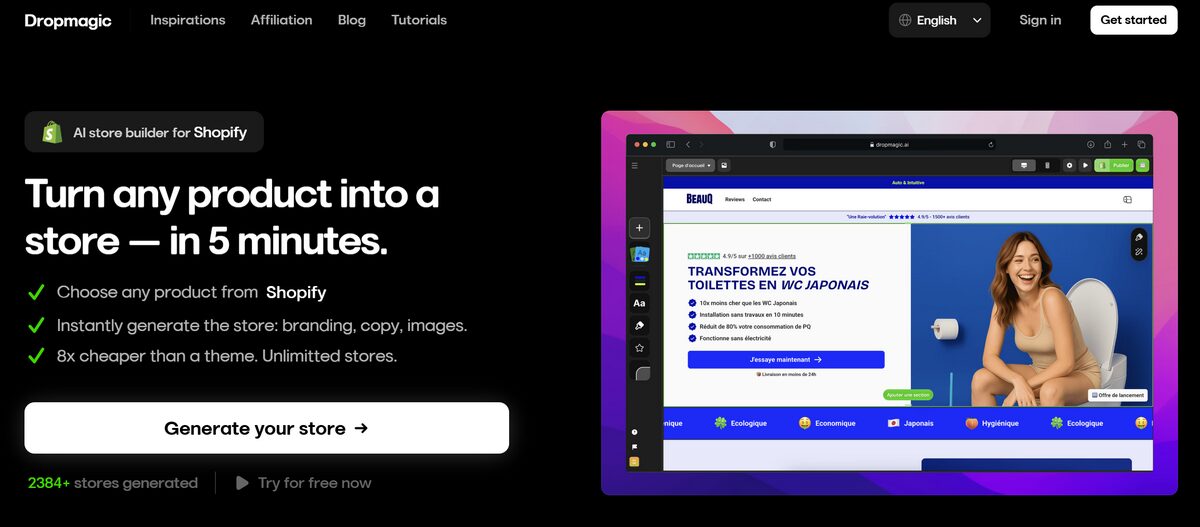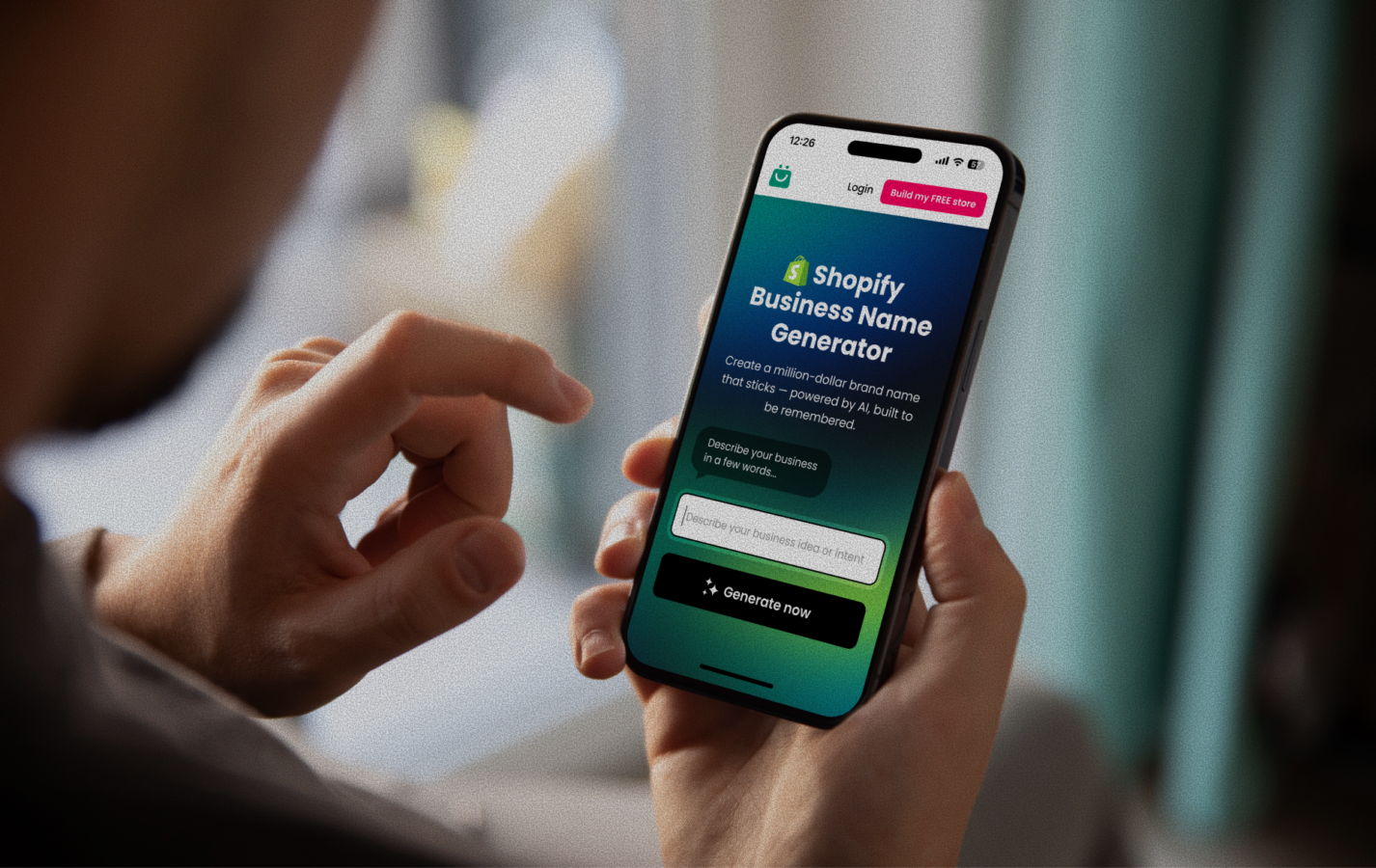One of the most important things to consider when building your dropshipping store is the website copy. SEO-optimized and good copy allow you to rank better on Google, generate organic traffic, build trust, and boost conversions. With that said, tools like BuildYourStore.ai help you build an optimized store with converting copy optimized for sales. But, can AI match, or even beat, human-crafted store content?
In this article, we’ll take a look at how AI-generated copy compares to human-crafted store content. We’ll also check out the strength and weaknesses of the top AI tools for store build.
Key Components of Effective Store Content
Effective store content rests on three pillars:
- Copy
- Layout
- Branding
Strong copy goes beyond just listing features. Persuasive product descriptions, engaging headlines, and clear calls-to-action (CTAs) drive conversions by speaking directly to customer needs. It addresses customer pain points and highlights value, ultimately driving conversions. But words alone aren’t enough. How your copy aligns with the visuals shapes the flow of the shopping experience, guiding visitors smoothly from browsing to purchase. A well-structured store guides shoppers naturally through the buying journey, reducing friction and encouraging them to take the next step.
Branding ties everything together, with tone, voice, and consistency working to establish trust, credibility, and a recognizable identity that keeps customers coming back. While human writers excel at weaving these aspects into a cohesive narrative, today’s AI-powered store builders are increasingly adept at handling all three.
According to G2’s curated guide on AI writing generators, “Leading AI writing generators commonly use powerful LLMs to deliver human-like text, tone control, and summarization.” This explains how modern AI tools are now capable of aligning copy with layout and branding elements, making them effective foundations for conversion-focused store content, especially when paired with human input and refinement.
Best AI Shopify Store Builders That Compare With Human Work
Finding a well-rounded and effective AI-powered Shopify store builder can be challenging. There are tons of them out there, but not all compare or outperform the human touch. Here are some AI Shopify store builders that are proven to provide exceptional results in website copy build:
- BuildYourStore.ai: Templates & Customization
- AutoDS: Balanced Automation + Human-Like Copy
- Dropmagic: Trained on 8-Figure Brand Copy
BuildYourStore.ai: Templates & Customization

BuildYourStore.ai is a powerful tool for sellers who want to launch quickly with professional, conversion-focused content. Using pre-made templates, it generates both store text and layout in a way that ensures product descriptions, headlines, and calls-to-action flow seamlessly with visuals. This not only creates a clean, polished look but also helps guide shoppers smoothly through the buying journey, boosting the chances of conversion.
Of course, since the platform relies on structured templates, you may want to customize and brand the copy to make it unique to your business. That said, with light customization, merchants can quickly infuse personality and their brand voice into the generated copy. This tool is a strong fit for store owners who prioritize getting their business online fast with a clean, professional foundation. You can then fine-tune the content over time for a more unique brand identity.
AutoDS: Balanced Automation + Human-Like Copy

AutoDS’ AI Store Builder is designed to take the heavy lifting out of creating store content by combining automation with persuasive copywriting. It pulls information directly from supplier data, then enriches it with AI-generated descriptions that highlight benefits, address customer needs, and use clear calls-to-action. Beyond just writing text, the tool integrates marketing psychology, adding urgency and social proof to build trust. Paired with AutoDS’ broader automation features like dynamic pricing and hands-off order fulfillment, AutoDS provides sellers with a seamless way to launch or scale a store that is fully automated and looks polished.
While the generated content is highly optimized for conversions, it still benefits from light human editing to ensure the tone fully aligns with a store’s unique brand voice. This balance makes AutoDS especially well-suited for dropshippers who want to scale efficiently without losing creative control.
Dropmagic: Trained on 8-Figure Brand Copy

Dropmagic.ai delivers strong conversion-optimized website copy. It achieves this by building its AI models using data from successful, high-performing stores, drawing on real examples rather than generic or template-only text. It scrapes the relevant supplier data and then enhances it with persuasive copy focused on conversion that includes catchy headlines, benefit-driven descriptions, and urgency elements.
That said, because Dropmagic is tuned for speed and “ready to sell” stores, there is a subtle trade-off. Some of the copy can sound “too salesy” or generic if it isn’t edited to fit a specific brand voice or niche. In other words, while what it generates is usually very good out of the box, stores that invest a little effort into tweaking headlines, adjusting tone, or refining specific calls-to-action tend to feel more authentic and build more trust.
Tips to Polish AI-Built Stores for Professionalism
Although most stores come ready to sell and are filled with great copy, having your own touch and character makes your store more engaging and helps you build a brand. Even the most advanced AI tools are best used as a starting point rather than a finished product. While AI can generate compelling copy and visually appealing layouts quickly, it often lacks the nuanced touch that makes a store feel authentic and uniquely yours.
To elevate an AI-built store, you can:
- Always edit for tone & niche voice.
- Add unique branding elements (story, visuals, guarantees).
- Layer in SEO keywords.
- Test different CTAs (A/B testing).
Use AI as a starting point, not the final draft. Start by carefully editing the copy to match your tone and niche voice. This ensures the messaging resonates with your target audience, whether you’re aiming for playful, luxurious, or highly informative language. Adding unique branding elements, such as your brand story, personalized visuals, satisfaction guarantees, or custom icons, helps you build a strong brand identity. It also differentiates your store from competitors and reinforces credibility.
Another key step is layering in relevant SEO keywords throughout product descriptions, category pages, and meta tags. This improves your store’s visibility on search engines and attracts organic traffic. Additionally, experimenting with different calls-to-action through A/B tests can reveal what phrasing or placement drives the highest conversions. This allows you to optimize the customer journey over time.
Frequently Asked Questions
Is AI-generated copy good enough to sell products?
Yes, especially when paired with strong layouts. But human editing adds brand personality and helps you differentiate yourself.
Which AI store builder creates the best product descriptions?
AutoDS stands out, with AutoDS offering more automation and customization. AutoDS can generate a full store with good copy and automate every aspect of the store from product importing to order fulfillment and everything in between. This helps you scale easier and faster.
Can AI-generated copy hurt conversions?
Yes, if it feels robotic or generic. Polishing tone and adding unique branding to the copy is key. This not only helps you build a brand, but also helps with trust and becoming recognizable.
How can I make AI copy sound more professional?
Refine CTAs, use customer-centric language, and edit for niche-specific style. Plus, make sure to add your own twist and style that will capture the tone of your brand.
Should I rely entirely on AI for my store’s branding?
No—AI is best for speed and drafts. Your brand story and trust-building elements should always be personalized and convey the tone of your business.
Conclusion
By treating AI-generated content as a foundation to refine rather than a final draft, store owners can combine the speed and efficiency of AI with the thoughtful customization and strategy only humans can provide. This approach not only results in a polished, professional storefront but also creates a shopping experience that feels intentional, trustworthy, and fully aligned with your brand identity.
Interested in more articles like this? Check out our blog:









